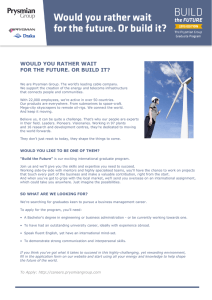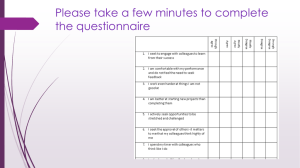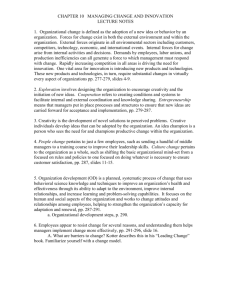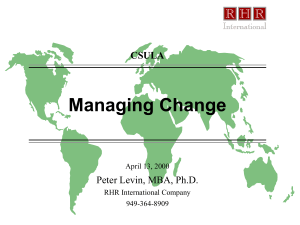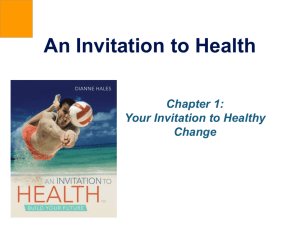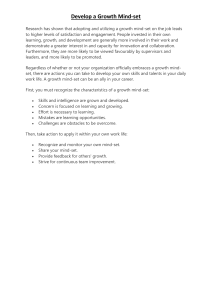Graduation Ceremony 4 Thursday 20th November 2014 at 4.30 p.m.
advertisement
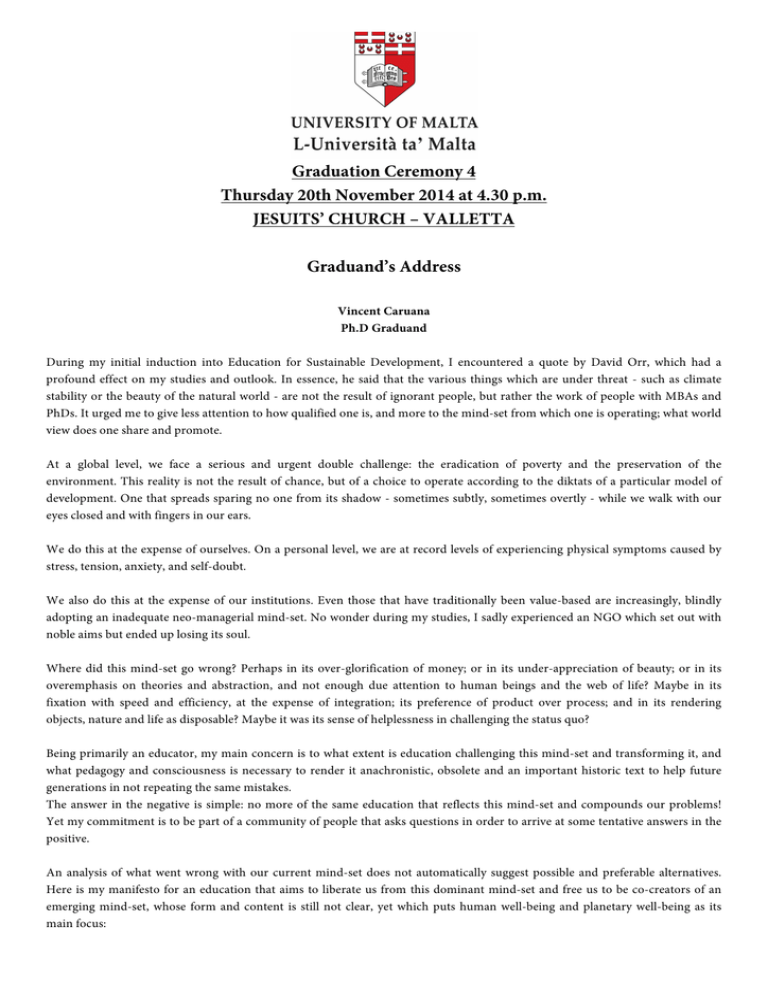
Graduation Ceremony 4 Thursday 20th November 2014 at 4.30 p.m. JESUITS’ CHURCH – VALLETTA Graduand’s Address Vincent Caruana Ph.D Graduand During my initial induction into Education for Sustainable Development, I encountered a quote by David Orr, which had a profound effect on my studies and outlook. In essence, he said that the various things which are under threat - such as climate stability or the beauty of the natural world - are not the result of ignorant people, but rather the work of people with MBAs and PhDs. It urged me to give less attention to how qualified one is, and more to the mind-set from which one is operating; what world view does one share and promote. At a global level, we face a serious and urgent double challenge: the eradication of poverty and the preservation of the environment. This reality is not the result of chance, but of a choice to operate according to the diktats of a particular model of development. One that spreads sparing no one from its shadow - sometimes subtly, sometimes overtly - while we walk with our eyes closed and with fingers in our ears. We do this at the expense of ourselves. On a personal level, we are at record levels of experiencing physical symptoms caused by stress, tension, anxiety, and self-doubt. We also do this at the expense of our institutions. Even those that have traditionally been value-based are increasingly, blindly adopting an inadequate neo-managerial mind-set. No wonder during my studies, I sadly experienced an NGO which set out with noble aims but ended up losing its soul. Where did this mind-set go wrong? Perhaps in its over-glorification of money; or in its under-appreciation of beauty; or in its overemphasis on theories and abstraction, and not enough due attention to human beings and the web of life? Maybe in its fixation with speed and efficiency, at the expense of integration; its preference of product over process; and in its rendering objects, nature and life as disposable? Maybe it was its sense of helplessness in challenging the status quo? Being primarily an educator, my main concern is to what extent is education challenging this mind-set and transforming it, and what pedagogy and consciousness is necessary to render it anachronistic, obsolete and an important historic text to help future generations in not repeating the same mistakes. The answer in the negative is simple: no more of the same education that reflects this mind-set and compounds our problems! Yet my commitment is to be part of a community of people that asks questions in order to arrive at some tentative answers in the positive. An analysis of what went wrong with our current mind-set does not automatically suggest possible and preferable alternatives. Here is my manifesto for an education that aims to liberate us from this dominant mind-set and free us to be co-creators of an emerging mind-set, whose form and content is still not clear, yet which puts human well-being and planetary well-being as its main focus: 1. In education, as in life, we need to let go of walls and embrace fluid borders. Does our rigid Faculty and discipline system allow for fluid borders? Can we eradicate poverty and preserve the environment through the current fragmentation? Or do we need to privilege systems-thinking as a new organisational model for our educational institutions, including University? In particular, can we keep on focusing on technological fixes without the human dimension? Can we have an engineer and an anthropologist in the same department? Or an economist and an ecologist in the same faculty? 2. We need “whole institution” approaches to our problems. Can we teach environmental education at University in a building which uses up lots of energy, fails to combine the best of traditional knowledge and modern technology, and relegates students and workers to an overdose of artificial lighting? Can we have a University without a waste management policy and action plan that reaches out in practice to each and every student and worker? When shall we kick-start a green and fair policy at University? Yes it requires funds! But so do the consequences of not having such a policy. Should we be indicted for externalising costs? Can we afford to teach global citizenship education while student open-days are increasingly more and more indistinguishable from trade fairs and expos? Are values taught or caught? 3. Rather than focus management on manipulating the earth to fit in our wants, let us focus on managing ourselves to fit in a finite planet. Can we have a procurement policy that goes beyond quality and price and privileges social and environmental responsibility and fair trade? Can we have a curriculum that recognises that there are limits to growth, that enough and sufficiency is an option, and that a life beyond peak oil is possible? Do we know the ecological footprint of our University? We can partner with universities that are already doing it and learn from them! 4. Let our education system focus not on assessing knowledge but wisdom. How many debates on assessment have actually focused on this? Do we fear the task or do we fear the wisdom? Let us start a participative project on wisdom indicators! 5. An emerging mind-set can only be co-created though opening up spaces for ordinary people – the 99% - to experiment, debate and have new conversations. Enough said about ivory towers. No one knows more about a problem and the experience of that problem than those mostly effected by it! As I wrote in my thesis, “Our challenge as educators is to empathise, to get our hands dirty, to go in the field, to understand this reality”. 6. Peer review is a wonderful form of self-regulation within professions that helps improve performance and provide credibility. Yet this does not mean that vernacular and local knowledge does not need to be captured and even more listened to. 7. I am enormously indebted to Paolo Freire and his seminal work The Pedagogy of the Oppressed. I do not think I have learned more from any educator than from him. We also need a Pedagogy of the Oppressor. Both the rich and the poor need to (re)discover their humanity. Paolo Freire had the courage to talk about a pedagogy of love in a world where it is no longer fashionable to talk about love. Love is the antidote to fear, including the fear of who we really are. Does education increase this fear or is it a liberating education? 8. What is education for? What is success? I propose increasing well-being, happiness and beauty as the three main inalienable, indivisible, interdependent and interrelated aims of all education programmes. Can we measure the happiness of students on entering University and on leaving University? What are the implications of such for University policy? 9. The current dominant world view is about centralisation. We have centralised energy sources, centralised producers and distributors of food, and of course centralised nodes of power. In the debates that ensue about alternative energy versus fossil fuel, and intensive farming versus organic farming, we sometimes miss the point of another, perhaps more important debate. Can energy be decentralised to a local level? To a community level? To a household level? Can food sovereignty be guaranteed as opposed to food security? Is education empowering communities to provide solutions at a local level? Are we in search of a panacea or do we need an infinite number of solutions, working in parallel, in synergy and inspiring each other? 10. We live in a complex world often characterised by chaos. Perhaps surprisingly, some people are doing remarkably well within this chaos. Is it because they recognise the inherent value of chaos or is it because of their remarkable resilience? Is it because they are willing to experiment and venture in the new and unknown or is it because of their determination of purpose? The examples of good practice which already abound can provide the foundation of an emerging paradigm. As Rosa Luxemburg had suggested, “We will only succeed if we do not forget to learn.” We need to capture these experiences and provide a methodology to learn from our experiences. In other words we need a participative systematisation to ensure that the lessons derived from positive experiences are not lost, but rather provide a base to build further upon them. 11. The underrated slacker is the antidote to efficiency and speed. Our education systems need to revalorise slackers and their unique contribution in beating exhaustion and the stresses of modernity. He or she gets more done through the very process of slacking. No one more than a slacker has understood the meaning of human well-being. I remember that during my first lecture, in my own initial teacher training, I learnt that education is about starting from the known and moving towards the unknown. This perhaps has remained my main guiding light, as a teacher and an educator. We need to begin where people are and, as Freire reminds us, “(dialogue) is the encounter between (people), mediated by the world, in order to name the world”. Education takes place in a political, cultural, environmental, social and economic context, then educators are required to deal with all these areas. A tall order, I might say, yet for me education is also about enjoying, relating and participating in the community in a conscious way, while remaining newly energised, open and hopeful. Working for the well-being of people and the planet includes our own well-being... as institutions, as workers, and as individuals. Losing our own personal work-life balance while promoting well-being is an easy trap to fall into. It is also a sign that we have forgotten how to work and rest because we are too disconnected from the cyclic nature of the earth and its seasons. Which is why I today promote the idea of mentorship and a critical friend as a core practice of education. Sometimes we just need to remind each other what the dominant paradigm wants us to forget. This is neatly encapsulated in what Satish Kumar calls a declaration of dependence, “You are, therefore I am”.

